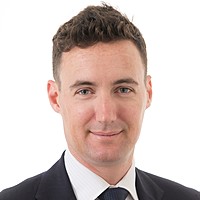My thoughts from Dubai Airport

Ellerston Capital
I’m on the way to Europe to see institutional clients for our new ESG L/S absolute return fund (we will look to make it available to Australian investors later this year) and I had a stopover in Dubai. It made me think of a previous comment about Dubai airport being where the “world crosses over” as it’s a hub for changing planes (as many weary Australians well know trudging around the terminal at 2am on the way to London).
And today makes a nice juxtaposition of the problems with global trade: on the TV in Dubai, here is Trump talking about putting tariffs on steel imports due to “America steelworkers being decimated by unfair competition “. In a world of global trade, these are the “losers” - for want of a better word - and there has been plenty of airtime about the effects of job losses and the opioid crisis in places like Pennsylvania.
The question that goes unanswered is: where are the winners? A: They are at Dubai airport. Or Dubai more generally!
Dubai airport is full of newly wealthy Chinese tourists intermingled with West African businessmen on the way to India; Arab families on the way back from holidays; Filipino maids on the way home.
Dubai itself is largely a globalisation construct. An odd merger of Miami meets Geneva - where some come for the sun and others come for a neutral ground to do business on. It’s a place that would unlikely exist in its current form without globalisation.
But here’s the rub with globalisation - none of these people here in Dubai vote in the USA. So, whilst globalisation works as a whole, the disaffected aren’t in the same voting system as the winners. Thus, globalisation ends up with its own “tragedy of the commons” - where what is optimal for one is not optimal for all. And that’s why the last great round of globalisation ended in 1932.
Alas, I’ve got no definitive answers for the reader as what happens next - but the prognosis is not good.
Lastly, addressing a few comments that came out of last week’s perspective series piece (Venture Capital is killing Capitalism): no I’m not a socialist calling for government control of everything.
Tweets really aren’t a great way to express a nuanced view of the world, are they? A side effect of tweets is everything has to be one or the other. One cannot possibly see positives in the other sides view. I happen to love capitalism and to paraphrase “it is because I love capitalism so much that I am willing to criticise it”. I happen to like Venture Capital (VC) and think Australia should have more VC firms, but context matters.
So, consider this proposition: control of factors of production is not the same as control as price discovery. Price discovery, or the market, is what most consider capitalism. Yet look at Singapore - apparently ranked first on measures of capitalist freedom. The government controls the land; the airport; the houses; the capital/money and the currency. Yet few would call Singapore socialist.
So governments can fund basic university research (and I might add control interest rates and land) rather than businesses funding it and a country can still not be Venezuela - believe it or not.
Want to stay ahead of the crowd? To receive more exclusive content from the Morphic team please visit our website.
3 topics

Chad co-founded Morphic Asset Management in 2012. As a stock picker Chad is also a generalist but has strong regional knowledge of Europe and the Americas. He has also been awarded the CFA Charter.
Expertise

Chad co-founded Morphic Asset Management in 2012. As a stock picker Chad is also a generalist but has strong regional knowledge of Europe and the Americas. He has also been awarded the CFA Charter.
